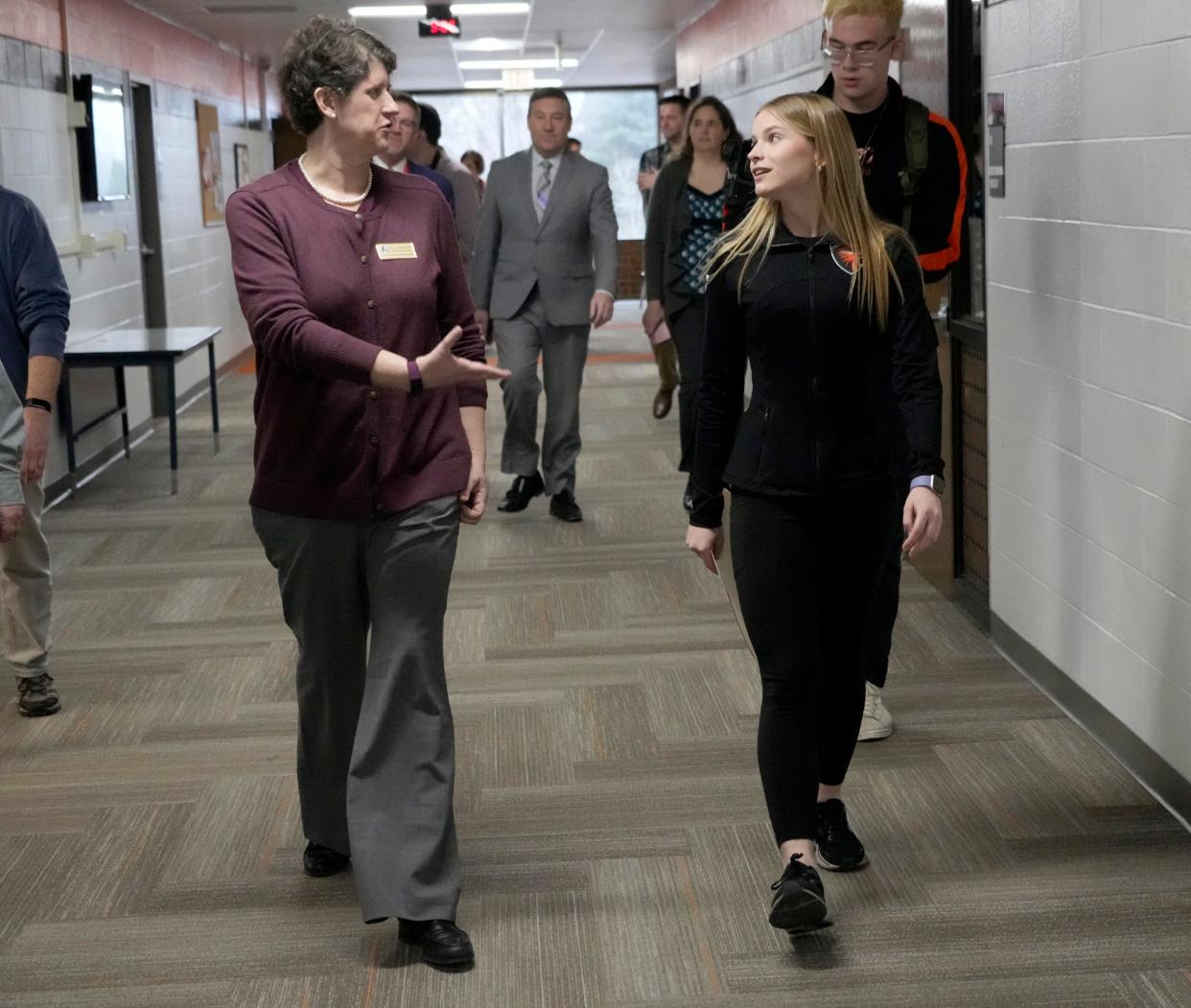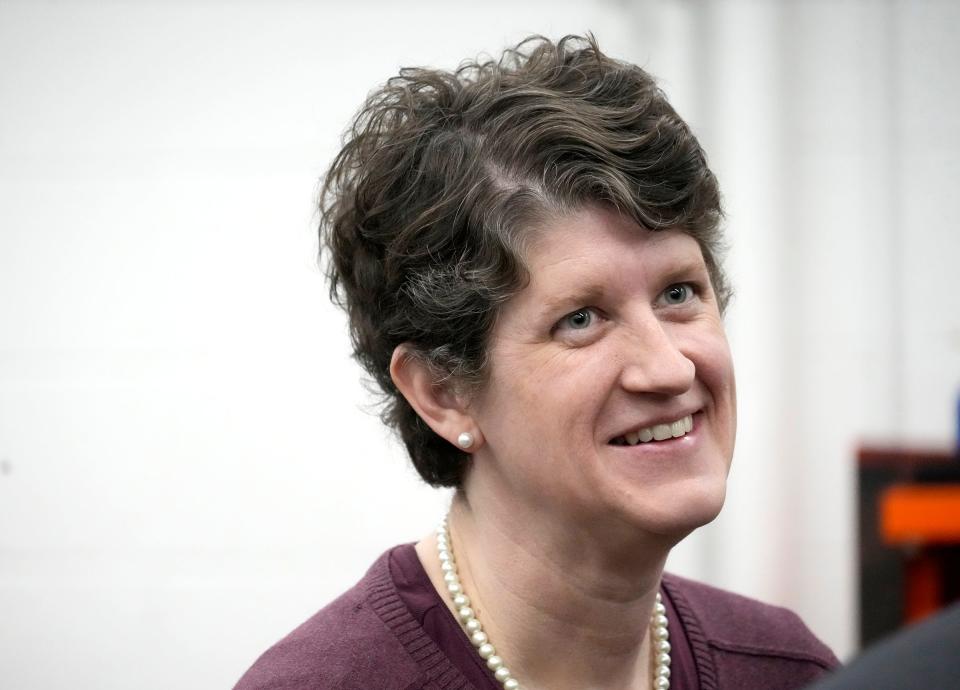Wisconsin's 'chief public school champion' Jill Underly, state Department of Public Instruction superintendent, is raising her profile

- Oops!Something went wrong.Please try again later.
It’s kind of a curious job, Wisconsin state superintendent of public instruction.
For one thing, there is not that much the superintendent can superintend. You oversee teacher licensing and distribution of state money to schools and some compliance issues, such as for the state’s private school voucher program. You can suggest or support standards for what Wisconsin students should learn and provide advice to schools on how to handle things.
But you can’t set the state budget; the governor and state Legislature do that. You can’t really tell public school districts what to do since, by law and tradition, they have “local control” and elect their own school boards. You generally can’t tell private schools much, even though you oversee administration of the state voucher program that gives them money. (In fact, since the voucher program began in 1990, Wisconsin has never had a superintendent who favored the program.)
What can you do?
“I’m the chief public school champion,” says Jill Underly, the current state superintendent.
DPI superintendent Jill Underly speaking out more on behalf of public education
A relatively low profile figure in the first couple years she was superintendent, Underly appears to be aiming to raise her profile, speaking out more often through news outlets, school visits and posts on social media.
First, there is a growing opinion among public school leaders and supporters that the whole sector faces times that are at best stressful and at worst heading toward existential crisis. It’s time to fight back and speak out, many advocates feel, and Underly is using the bully pulpit of being the only person elected to statewide office as an education leader.
Second, although it is off the radar for the general public now, the next election for state superintendent isn’t far away. Presumably, it is on the minds of a few insiders in both the more liberal and more conservative education camps. The election will be in April 2025, a mere 14 months from now, and Underly is intending to run for a second four-year term.
(Consider an interesting fact: Underly recently added a widely known political consultant, Sachin Chheda, to her staff. Chheda, who played a significant role in Underly’s winning 2021 campaign for superintendent, has the title of executive director of the office of the state superintendent.)
Although officially a nonpartisan position, the dynamic of elections for state superintendent for the last couple decades has been to have one candidate supported by teachers union supporters and Democrats face off against another candidate supported by school voucher program advocates and Republicans. The liberal side has won every race. I the spring 2021 election, Underly defeated former Brown Deer school superintendent Deb Kerr by 58% to 42%.
In a recent interview, Underly did not directly respond to a suggestion that she is working to raise her profile. “I’m trying to raise awareness of public education,” she said.
Underly says state funding for education is 'broken'
Public schools didn’t do well in the state budget adopted in 2023. “A lot of it is messaging,” Underly said. The message that public schools need more money hasn’t gotten much support in recent years, especially in the Republican-controlled Legislature. One response has been a surge of referendum initiatives, many of them successful, in which school districts across Wisconsin have won local taxpayers’ approval of spending beyond state limits.
Underly called the statewide system for funding education "broken.”
Two reasons come to mind:
She said spending on special education is creating deficits for public schools in general. However, the last two state budgets brought only modest increases in state support for special ed. At roughly a third of the total cost, Wisconsin state funding of special ed is among the lowest in the country.
“There are a lot of challenges” for schools, Underly said, “and they all go back to funding. ... We can’t have successful public schools with these declines in resources.”

Statewide, the private school voucher program has grown substantially in recent years. School voucher amounts and per-student payments to charter schools were raised by thousands of dollars in the state budget passed in 2023; public schools received $325 more per student in the first year of the budget and another $325 in the second.
The state cannot afford two school systems, Underly said. What would she favor if she had control of the future of vouchers? She held her answer to saying she would stop the growth of the number of students in the voucher program.
“Public schools serve everyone,” she said. “It’s very clear that we need to put our funding into public school programs.”
New maps could mean state superintendent job could become more influential
Beyond funding issues, Underly has been outspoken on the liberal side of intense social issues that are shaping the climate around schools.
In a speech at the statewide convention of school board members and school administrators in Milwaukee in mid-January, Underly said schools need to be welcoming places for all children, including LGBTQ+ students. ”Successful schools are where every kid is welcomed and affirmed,” she said.
In the interview, she said politics has infiltrated schools and kids feel that. “Kids need to feel seen, they need to feel safe,” she said.
One arena where the influence of state education superintendents has increased in recent years has been in shaping the use of federal money for education, carrying out federally mandated policies, and promoting education plans such as the “common core standards” for what children should learn. That includes a sizable (but definitely not controlling) role in overseeing use of large sums of federal COVID aid to schools.
But big-time national education initiatives and hefty influxes of new federal money seem unlikely for the foreseeable future, which could reduce the already-limited influence of the state superintendent and the Department of Public Instruction.
On the other hand, the growing chance that legislative district boundaries will be changed, even before this fall’s elections, and that the changes will reduce or even eliminate the Republican majorities in the state Assembly and Senate, could mean public school advocates such as Underly will have a bigger role in setting state policy. In recent budget cycles, proposals from the Underly and her predecessors have been given little weight by legislative leaders.
Being the chief public school champion in Wisconsin hasn’t made Underly a heavyweight in education decision making. But possible changes in whose voice matters might give the state superintendent more clout ahead.
Alan J. Borsuk is senior fellow in law and public policy at Marquette Law School. Reach him at alan.borsuk@marquette.edu.
This article originally appeared on Milwaukee Journal Sentinel: Wisconsin education leader Jill Underly speaks out

